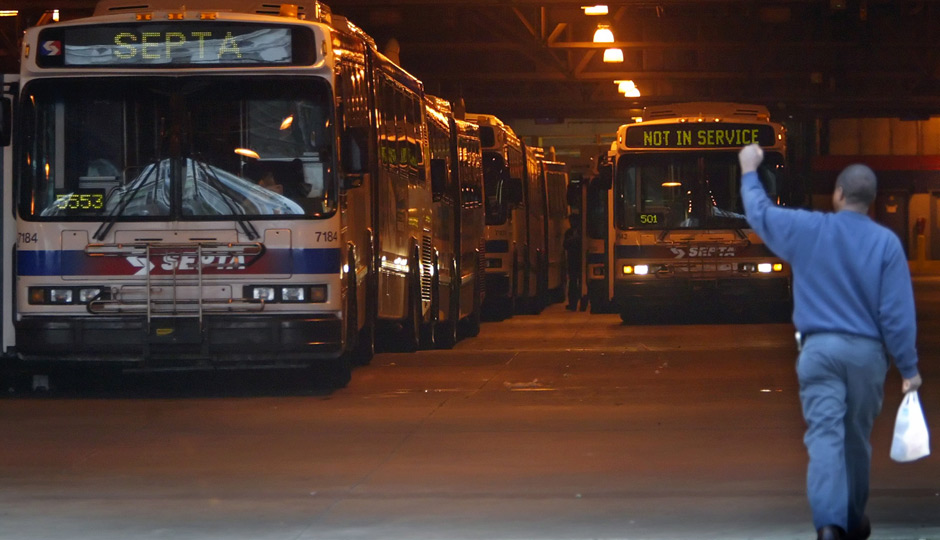Interview: Willie Brown Doesn’t Want a SEPTA Strike — but He’s Ready to Have One Anyway

An employee of Southeastern Pennsylvania Transportation Authority raises his fist in the air, Friday, Oct. 28, 2005, while entering a SEPTA bus depot in north Philadelphia. | AP Photo, Joseph Kaczmarek
It’s going to be a scary weekend for commuters in the Philadelphia region: The final contracts between SEPTA and its unions expire at midnight Sunday. The unions haven’t declared they’ll go on strike then — assuming the two sides still can’t settle a contract — but many residents were caught by surprise in 2009 when a SEPTA strike broke out suddenly after the last home game of the Phillies-Yankees World Series that year.
Willie Brown, the high-profile head of TWU 234, SEPTA’s largest union, won’t declare a strike deadline. He says he doesn’t want a strike. But he’s willing to have one if the two sides can’t get a contract. He talked to Philly Mag this week.
Are you at all close on any issue, or are you still as far apart as you were at the beginning?
We’re miles apart.
I know the contracts of the other unions expire this week. Do you have an actual strike deadline at this point?
I don’t have a strike deadline. My objective is to get a contract, that’s my role. I don’t have a strike deadline.
If you do strike, will Philadelphians be given much notice this time? I know back in 2009 some folks were cranky when they woke up, went to their trolley stations and found you folks were on strike. Will there be any advance notice for the public?
I can’t pinpoint what’s going to happen in the future, I’m not even concentrating on that. I can’t say.
You say you’re “miles apart.” What are the biggest issues that you’re miles apart on?
We’re miles apart on things such as the time of the contract, whether it will be five years or a two-year contract. We’re miles apart on health care, on pensions, all the major things are still sticking points.
Has there been any movement on either side during this time, or is everybody where they were at at the beginning of this process?
We believe we owe this much to them: We forego our right to strike and agree to binding arbitration.
That’s something they’ve refused to agree to so far.
They refused it. The question has to be why? Binding arbitration is not a slam-dunk on my behalf. It’s not a slam-dunk on their behalf. The question is, if you’re confident in your position, then why wouldn’t you go to a neutral party? I think that would be fairly simple.
I don’t want to go on strike. It’s not something I want to do.
How do you create solidarity with Philadelphians? It’s a labor-friendly town, yet it was hard to discern in the last strike. Is there a way you can fight for your rights, yet reach out to Philadelphians and keep them on your side?
I wouldn’t say I agree with that. You remember, after I lost the (union president election, after the 2009 strike) I went back to operating a trolley. I was received very well by the riding public. I guess it depends who you talk to.
Anytime there’s a major stoppage, somebody’s going to get upset. You’ve got to do the right thing.
What are you hearing from your membership?
My membership, they don’t want to strike. They want to work. But they’re willing to strike to protect our rights.
There are a lot of people who say that there are things you’re trying to negotiate that are things regular taxpayers in Philadelphia don’t get — pension guarantees, the ability to not pay so much for insurance. That’s frustrating to people whose private sector jobs don’t provide benefits as good as what you’re trying to get on behalf of your membership. How do you respond to that?
Here’s what I say: If they’re not getting the same things they should be getting the same things. After the negotiations, I’m willing to come and organize any group that needs organized. … Don’t you believe you deserve a pension plan as much as the top people in your own company? It’s a race to the bottom.
Do you worry if you do go on strike that you’ll knock down ridership to the point it won’t pay for salaries? Is that a worry at all?
Because this is a career for me, being a bus driver, a trolley operator, yes I concern myself with that, yes I do.
If you take what SEPTA’s saying seriously, ridership is higher than it’s been the last 50 years. In the past, we’ve gone in and asked to be treated fairly — they’ve said “We can’t treat you fairly because the economy’s down, even though ridership was good. And then the economy is rebounding and ridership is at an all-time high, and you still can’t be treated fairly?
Follow @JoelMMathis on Twitter.


